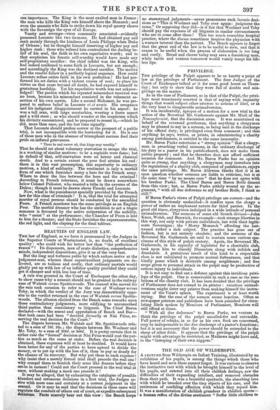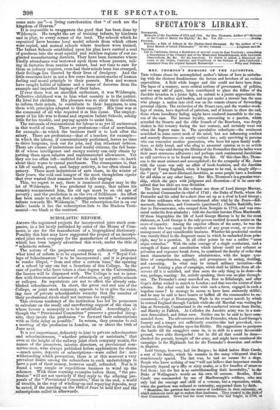THE OLD AGE OF WILDERSPIN.
A LECTURE from Wilderspin on Infant Training, illustrated by an exhibition of his pupils, is among the things which those who have heard and seen them cannot forget. It was curious to observe the instinctive tact with which he brought himself to the level of his pupils, and entered into all their childish feelings, saw the difficulties of their expanding intellect, and removed obstacles from their path. It was a beautiful spectacle, the absorbing love with which he brooded over the tiny objects of his care, and the entireness of confiding affection with which they repaid him. It was a manifestation of childish grandeur in childish sports— a human reflex of the divine sentiment "Suffer little children to come unto me "—a living corroboration that "of such are the kingdom of Heaven."
It is impossible to exaggerate the good that has been done by Wilderspin. He taught the art of training infants, by kindness and in play., to every corner of the land. The schools which he organized have become local model schools from which others were copied, and normal schools where teachers were trained. The Infant Schools established upon his plan have carried a soul of goodness into the most squalid and reckless regions of our ne- glected manufacturing districts. They have been nurseries where kindly attendance was bestowed upon those whose parents, toil- ing in factories from sunrise to sunset, had not time to care for them as infancy requires, even had their minds been less cramped, their feelings less blunted by their lives of drudgery. And the
• little creatures have in not a few cases been missionaries of human • feeling and moral principle to their parents. Men and women have caught habits of tidiness and a sense of decorum from the example and imperfect lispings of their babes.
If ever there was an unselfish enthusiast, it was Wilderspin. Collective childhood was to him what country is to the patriot. He lived for children. His pleasure was to elicit their faculties, to inform their minds, to contribute to their happiness, to arm them with principles adapted to their capacity. His time was at , the command of all who required it in this cause. The employ- ment of his life was to found and organize Infant Schools, ailing little for his trouble, and paying agents to assist him.
The rationale of remuneration for labour is as yet ill understood in this world of ours. There are professions—that of merchants, for example—in which the business itself is to look after the salary. There are professions—that of a teacher, for example— in which the labour, if conscientiously performed, leaves no time • to drive bargains, look out for jobs, and dun reluctant debtors. There are classes of industrious and useful citizens, the full bene- fit of whose intelligence and energy society can only obtain by putting them upon salaries and superannuated allowances. Yet they are too often left—unfitted for the task by nature—to hawk about their wares to casual purchasers. The consequence is, that a life of useful, proud, and happy activity, is too often closed in penury. These most industrious of ants share, in the winter of their years, the cold and hunger of the most thoughtless eigales that ever wasted their summer hours in idle singing. This, we regret to say, there is imminent danger may be the lot of. Wilderspin. It was predicted by many, that unless his country remunerated him, his old age must be an old age of poverty; and the prediction is on the eve of fulfilment. An effort has been made to set on foot a subscription towards "a national tribute towards Mr. Wilderspin." The subscription-list is on our table : beside it lies the subscription-lists to the Hudson Testi- monial—we blush at the contrast.



























 Previous page
Previous page